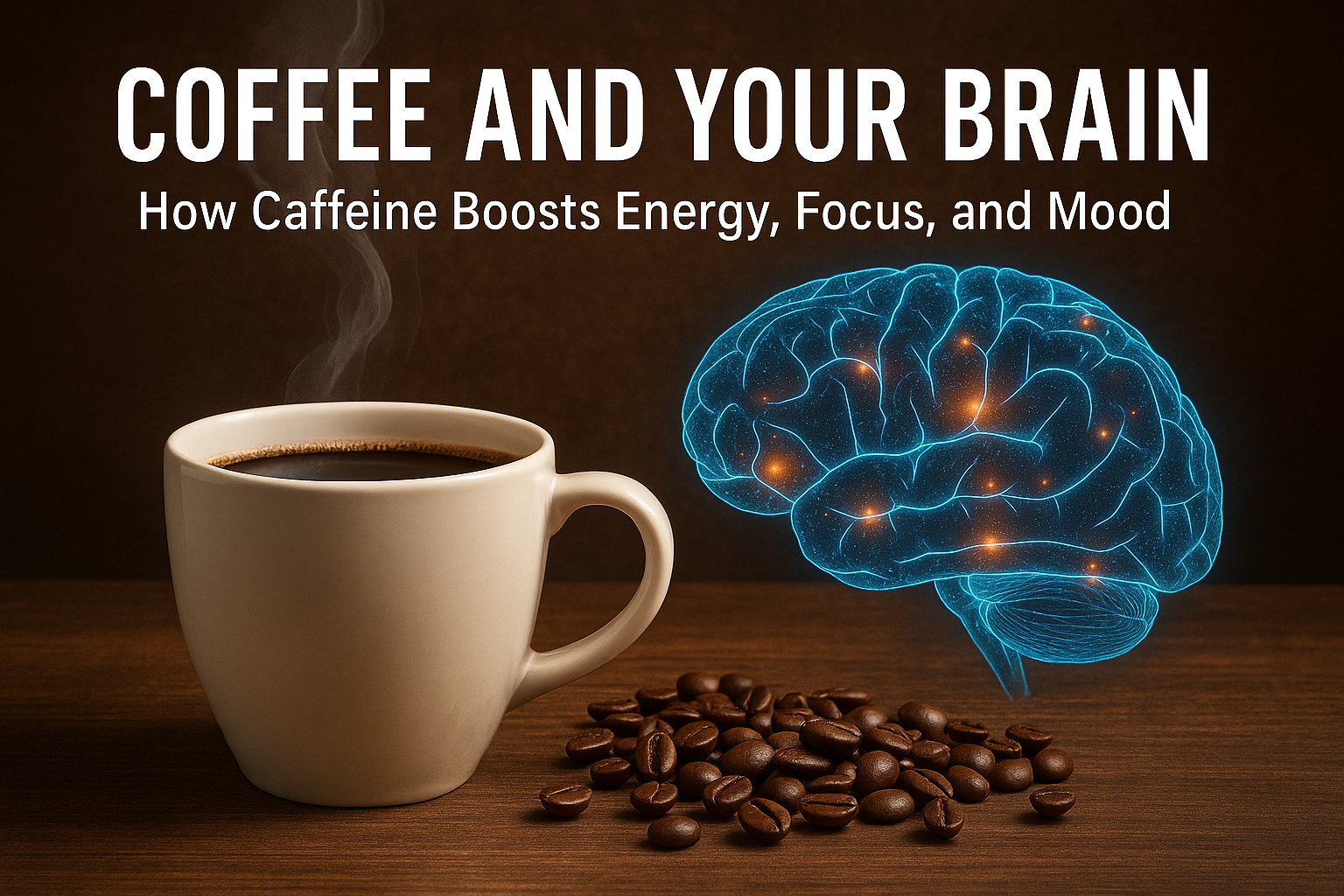Millions of people start their day with a cup of coffee—not just for the comforting warmth, but for the unmistakable mental jolt it provides. But what exactly happens in your brain when you drink coffee?
How does caffeine work, and why does it make you feel more awake, alert, and even happier? In this article, we’ll explore the neuroscience behind coffee and how it affects your energy, focus, and mood.
What Is Caffeine?
Caffeine is a natural stimulant found in coffee, tea, chocolate, and certain plants. In coffee, it’s one of the primary compounds responsible for its energizing effects.
Chemically speaking, caffeine is a methylxanthine, a class of compounds that stimulate the central nervous system. When you drink coffee, caffeine enters your bloodstream through the digestive tract and reaches your brain within 15 to 45 minutes.
The average 8-ounce (240 ml) cup of brewed coffee contains about 80 to 100 milligrams of caffeine, though this can vary depending on the type of bean, roast level, and brewing method.
How Caffeine Affects the Brain
The key to caffeine’s power lies in its ability to block adenosine receptors.
What Is Adenosine?
Adenosine is a neurotransmitter that your brain produces throughout the day. Its primary role is to promote sleep and relaxation. As adenosine levels build up, you begin to feel drowsy. It’s part of your body’s natural sleep-wake cycle.
Caffeine: The Adenosine Impostor
Caffeine mimics adenosine’s shape and binds to the same receptors in your brain. But instead of making you sleepy, it blocks adenosine’s calming effects. This leads to:
- Increased alertness
- Reduced perception of fatigue
- A temporary feeling of energy and mental sharpness
At the same time, caffeine stimulates the release of dopamine, norepinephrine, and glutamate—neurochemicals that elevate mood, attention, and reaction time.
Short-Term Benefits of Caffeine
Caffeine’s effects kick in within minutes and can last for 3 to 6 hours, depending on your metabolism. Here are the key short-term mental benefits:
1. Increased Alertness
By blocking adenosine and boosting stimulatory neurotransmitters, caffeine helps keep you awake and mentally alert. That’s why coffee is popular in the morning or during mid-afternoon slumps.
2. Improved Focus and Cognitive Function
Studies show that moderate doses of caffeine can improve:
- Attention span
- Reaction time
- Short-term memory
- Logical reasoning
This is especially noticeable when you’re sleep-deprived. Caffeine can’t replace sleep, but it can temporarily counteract some of its negative effects.
3. Enhanced Mood
Caffeine boosts the production of dopamine, the “feel-good” neurotransmitter associated with pleasure and reward. This can help improve your overall mood and reduce the risk of depression in moderate coffee drinkers.
4. Increased Physical Performance
Though this article focuses on mental effects, it’s worth noting that caffeine also stimulates the release of adrenaline, enhancing physical performance, especially in endurance activities. That’s why many athletes drink coffee or take caffeine supplements before working out.
Does Caffeine Make You Smarter?
Caffeine doesn’t make you smarter in the long term, but it can enhance executive functions—the mental skills used in decision-making, planning, and problem-solving—especially when you’re tired or under pressure.
That’s why coffee is a popular companion during exams, deadlines, or high-stress work periods.
Long-Term Brain Health and Coffee
While caffeine provides immediate mental benefits, regular coffee consumption may also offer long-term protection against cognitive decline.
1. Reduced Risk of Neurodegenerative Diseases
Several studies suggest that regular coffee drinkers have a lower risk of developing:
- Alzheimer’s disease
- Parkinson’s disease
- Dementia
Researchers believe this is due to a combination of caffeine, antioxidants, and other bioactive compounds in coffee that protect brain cells and reduce inflammation.
2. Protection Against Depression
Longitudinal studies show that people who drink 2 to 4 cups of coffee per day may have a lower risk of depression and suicide. The mood-boosting effects of dopamine and serotonin, combined with coffee’s social role, may contribute to this benefit.
How Much Coffee Is Too Much?
Moderation is key. According to most health guidelines, up to 400 mg of caffeine per day (about 4 to 5 cups of coffee) is considered safe for most healthy adults.
Excessive caffeine intake can lead to:
- Anxiety or jitteriness
- Insomnia
- Digestive issues
- Increased heart rate
- Dependence or withdrawal symptoms
Some people are more sensitive to caffeine due to genetics or existing health conditions. If you experience side effects, consider reducing your intake or switching to lower-caffeine options like light-roast Arabica or decaf.
The Habit Loop: Coffee and Routine
Coffee doesn’t just work on a chemical level—it also taps into your psychological habits.
For many people, the ritual of brewing and drinking coffee provides mental comfort, a sense of control, and a moment of pause. This routine can help reinforce positive habits, such as:
- Starting the day with focus
- Taking regular breaks
- Pairing coffee with creative or productive activities
This habit loop—cue (wake-up), routine (brew coffee), reward (alertness)—is why coffee becomes such an integral part of daily life.
Alternatives to Coffee for Mental Energy
While coffee is effective, it’s not the only option. If you’re looking for alternatives or want to reduce caffeine intake, consider:
- Green tea – Lower in caffeine, rich in L-theanine for calm focus
- Yerba mate – Popular in South America; delivers a gentle buzz
- Chicory root “coffee” – Caffeine-free, rich in prebiotics
- Adaptogenic drinks – Include herbs like ashwagandha or lion’s mane for stress resilience and focus
These can provide mental clarity without the potential downsides of over-caffeination.
Final Brew: A Brain-Boosting Beverage
Coffee is more than a pick-me-up—it’s a neuro-enhancing ritual. By blocking adenosine, boosting dopamine, and engaging multiple brain systems, caffeine helps improve focus, mood, and mental energy. And when enjoyed in moderation, coffee may even protect your brain long into the future.
So next time you reach for your mug, know that you’re not just waking up your body—you’re lighting up your brain.

Marcelo Oliveira is a coffee enthusiast and content creator specializing in barista skills, brewing methods, equipment reviews, coffee-related health insights, and fascinating curiosities from the coffee world. With a deep passion for every step of the brewing process, he turns technical knowledge into accessible and engaging content for both beginners and seasoned coffee lovers. Marcelo’s goal is to help readers appreciate the full experience of coffee—from bean to cup.
